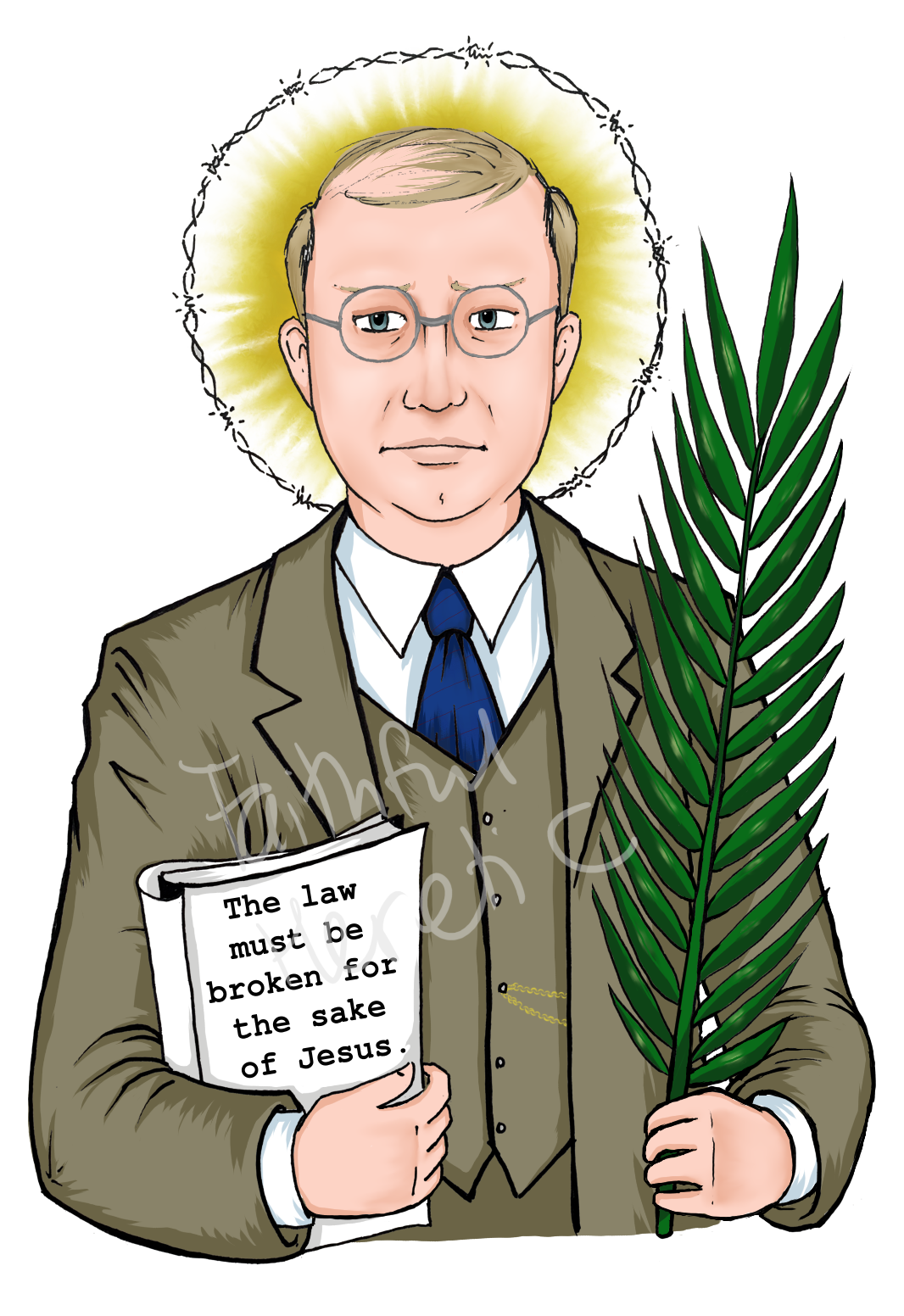Dietrich Bonhoeffer
1906-1945, Germany
Feast Day: April 9

Background:
Dietrich Bonhoeffer was a Lutheran pastor and theologian turned antifascist organizer, executed as a dissident by the Nazi regime and reborn as a Christian martyr. His most famous work, The Cost of Discipleship, expounds on the Sermon on the Mount as a pattern for Christian life and calls on disciples to practice militant non-resistance.
Bonhoeffer's most famous idea is his articulation of "cheap grace" versus "costly grace." Cheap grace is the belief in salvation without works, which rejects any form of orthopraxy as "legalistic." Bonhoeffer criticized this on the grounds that it is an insult to the suffering and sacrifice of Jesus. Bonhoeffer's primary target was his fellow Lutherans, whom he said had "gathered like eagles round the carcase of cheap grace." He saw the fruits of this laxity all around him, with the rise of Nazism and the persecution of vulnerable people.
Bonhoeffer came from a traditionally privileged background of intellectuals and scholars and came of age during the interwar period (he was about 12 when WWI ended). It would have been very easy, and maybe even expected, for him to buy into Nazi ideology. He didn't. His scholarship is very old-school and is not free of anti-Judaism. (Shamefully, no one really started dismantling this until after the war.) He did not, however, let it turn him into an anti-Semite. He was an early and zealous dissenter, and his family showed support and solidarity with their Jewish neighbors. He helped smuggle Jews out of the country, and was executed in association with the July 20 plot to assassinate Hitler. When he talks about what it means to be a "disciple," he's really talking about what it means to be a German antifascist in the 1930s. He's not talking about what it means to be a Christian in contrast to a Jew or a pagan or an atheist, he's talking about what it means to be a follower of Jesus in contrast to someone who just goes to church and believes themselves to be "saved."
A disciple, for Bonhoeffer, recognizes no law but the law of Christ. This does not make the disciple "lawless," but rather, the disciple holds themselves to the law which Jesus prescribes in the Sermon on the Mount. A disciple practices self-government, self-control, and self-denial. A disciple practices asceticism (specifically fasting). A disciple has, at most, one sexual partner and treats them with the utmost respect. A disciple practices non-retaliation. A disciple keeps their faith and practice hidden before others. Ultimately, Bonhoeffer expresses my own belief that Jesus and the early Christians weren't explicitly "anti-Roman Empire" insurgents. They were more like militant anarcho-pacifists. They repaid evil with good, and were persecuted for doing so. Something like the existence of imperial power is a difficult fact of life in a fallen world, and they simply did not have the numbers or hard power to "fight against them." But, they resist through their non-resistance. They show kindness and fellowship where there was none. They're not partisan revolutionaries; they're simply unconcerned with fighting back on the world's terms. This can be in conversation and disagreement with more militant liberation theologies which hold that the Church CAN and SHOULD be explicitly revolutionary, but context matters. Bonhoeffer and his dissident Confessing Church could not feasibly be revolutionary militants. Their survival, and their works of mercy, were protected by their non-resistance. They hid. They worked in the shadows. I think the Early Church was pretty similar.
Iconography
- "The law must be broken for the sake of Jesus": This is a line from the introduction to The Cost of Discipleship. It is a reminder that when the law is evil or unjust, doing the right thing implies breaking the law.
- Palm frond: a traditional symbol for martyrs. Bonhoeffer was executed as a dissident by the Nazi regime, and in his writing he praises the discipleship of martyrs.
- Barbed wire: a prominent feature of Nazi prison camps. It may also be symbolic of the self-discipline which helped Bonhoeffer and other resisters to stay hidden.
Further Reading:
https://qspirit.net/dietrich-bonhoeffer-eberhard-bethge/